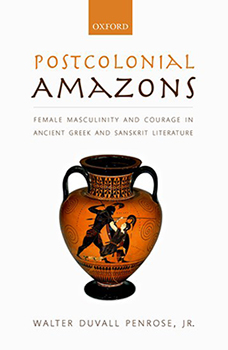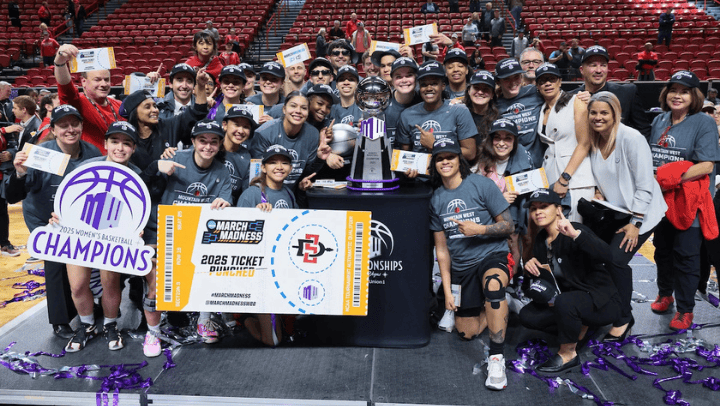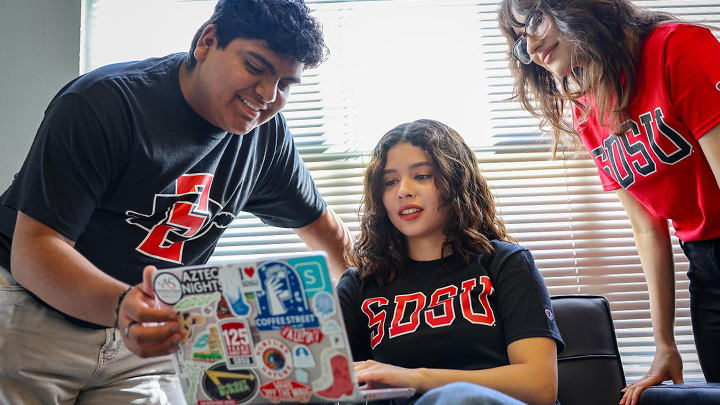Aztec Authors: Postcolonial Amazons
History professor Walter Penrose analyzes ancient Amazons and the history and stigma of powerful women.

Author: Walter Penrose, professor in the department of history
Book title: "Postcolonial Amazons: Female Masculinity and Courage in Ancient Greek and Sanskrit Literature"
1. Give us a brief overview of what your book is about.
Against the backdrop of the ongoing debates surrounding gender norms and fluidity, Postcolonial Amazons breaks new ground as an ancient history of female masculinity and demonstrates that these ideas have a much longer and more durable heritage than we may have supposed.

The book bridges the gap between myth and historical reality, and expands our perception of the Amazon archetype. By shifting the center of debate to the periphery of the region known to the Greeks, the startling conclusion emerges that the ancient Athenian perception of women as weak and fearful was not at all typical of the world of that time, even within Greece. Surrounding the Athenians were numerous peoples who held that women could be courageous, able, clever, and daring, suggesting that although Greek stories of Amazons may be exaggerations, they were based upon a real historical understanding of women who fought.
While re-examining the sources of the Amazon myth, this volume also looks at the Amazons in a broader context, illustrating that although they were the quintessential example of female masculinity in ancient Greek thought, they were not the only instance of this phenomenon. Masculine women were masqueraded on the Greek stage, took part in the struggle to control Alexander the Great's empire after his death, and served as bodyguards in ancient India.
2. What inspired you to write about this topic?
I was raised by several strong women—a mother, two grandmothers, a sister, and an aunt—and I learned to respect women in a way that many men don’t. As a graduate student, I read over and over that the Amazon women warriors were figments of the Greek imagination. At the same time, I was writing about women bodyguards in premodern India. I began to question the Western stereotypes that consider women to be weak, fearful and incapable. I also realized that most scholarship on Amazons had been couched in such negative stereotypes. The more and more I sought to unravel the mystery of the Amazons, the more I realized the Greek legends of the Amazons, even if they were exaggerated, were based upon historical truth. Archaeological evidence of warrior women has been uncovered in the very places that ancient Greek authors said the Amazons lived. Women bodyguards were imported into ancient India from these same places as well.
3. How does this book connect with past research you’ve conducted?
This book is a complete and total revision of my dissertation research. It also relates to other research that I am now conducting on powerful queens in ancient Turkey, Egypt, and Syria.
4. How does this book connect with current events and modern topics?
Powerful women today are still held to different standards than men. In my blog written for Oxford University Press on Nov. 7, 2016, I noted that Hillary Clinton’s actions in using a private email server were no different than those of her male predecessors. Yet she was maligned for these actions, investigated over and over, and ultimately lost the election. In the blog, I compare Hillary Clinton to Cleopatra, the last pharaoh of Egypt, and Olympias, the mother of Alexander the Great. These women have also been maligned because they were powerful, yet they did nothing different from men in power. Additionally, the book provides past precedents for female Army Rangers and other strong and courageous women who serve in our armed forces today.
It also connects to popular movies and literature. “Wonder Woman” is in fact an Amazon princess. My hope is that when the new Wonder Woman movie is released in 2017, readers will have the background necessary to understand her origins by surveying the myths of the Amazons against the historical reality from which they were derived.
5. What did you learn from writing/editing this book?
I learned that women who were smart, outspoken, or courageous were called ‘masculine’ by ancient Greek authors. While such behavior was frowned upon in ancient Athens, other peoples in the ancient world looked more positively at women who were smart and courageous.
6. Why should people read this book?
Thousands of years after the Amazons lived, we are still dealing with the effects of misogyny in our nation. The glass ceiling remains firmly entrenched. My book provides readers with positive examples of powerful, courageous and smart women. It unlocks the mystery of the ancient Amazons, explaining how the phenomenon of the Amazon arose in the first place, underscoring how the Amazons of Greek myth were a reflection of historical reality. The Amazons have fascinated the imaginations of countless people over thousands of years. Now, readers can understand who the Amazons really were.
7. Why is this important to SDSU?
Postcolonial Amazons investigates the concepts of female masculinity and gender diversity in the remote past. It underscores the ethnic diversity of ancient peoples. SDSU is committed to diversity, and has thriving history, classics, women’s studies, and LGBTQ studies programs. These are all areas to which my book makes an important contribution. Prior to the publication of Postcolonial Amazons, little research on female masculinity in the premodern world had been conducted. My book provides an important link to understanding gender diversity and the power of women in the past that has been understudied.
Published by Oxford University Press, Postcolonial Amazons is on sale now in the United States and the United Kingdom.



